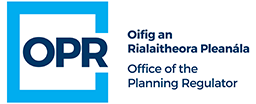
About The Office of the Planning Regulator
The Office of the Planning Regulator (OPR) was established in April 2019 on foot of recommendations made by the Tribunal of Inquiry into Certain Planning Matters and Payments (the Mahon Tribunal).
Our role is to ensure that local authorities and An Bord Pleanála support and implement Government planning policy.
We also implement planning research, training and public awareness in order to promote the public’s engagement in the planning process and to enhance knowledge and public information about planning in Ireland.
Watch our video or visit the drop down menu below to find out more.

Who We Are
The Office of the Planning Regulator (OPR) was formally established in April 2019 on foot of recommendations made by the Tribunal of Inquiry into Certain Planning Matters and Payments (the Mahon Tribunal).
The appointment of an independent Planning Regulator, empowered to oversee the planning system in Ireland, was one of the key recommendations of the Tribunal.
Niall Cussen was appointed the Chief Executive and Planning Regulator in April 2019. Pursuant to Section 31N(1) of the Act, the Planning Regulator is a ‘corporation sole’ and is supported and advised by 4 directors and the Finance, Audit and Risk Committee. The Regulator and the directors form an executive board of the OPR, which operates under Terms of Reference.
While not a policy-making body, the OPR’s role is to ensure that local authorities and An Bord Pleanála correctly implement national and regional policy at all stages of the planning process.
We also put in place programmes of research, training and public awareness in order to strengthen the planning process and so that the wider public become more engaged and have a better understanding of its importance.
What We Do
The Planning and Development Act 2000, as amended, (the Act) gives the OPR a statutory basis to carry out three main functions:
Evaluation of Statutory Plans
In accordance with sections 31AM and 31AO of the Act, the OPR has responsibility for independently assessing all statutory forward planning with a view to ensuring that the plan provides for the proper planning and sustainable development of the area concerned. This includes evaluating city and county development plans, local area plans and variations/amendments to these plans.
Firstly, the OPR provides the relevant local authority with observations and/or recommendations regarding how a plan should address legislative and policy matters.
The relevant local authority must then outline how these observations and recommendations will be addressed, taking account of the proper planning and sustainable development of the area.
If an adopted plan is subsequently not consistent with any statutory recommendations, the OPR may issue a notice to the Minister recommending that powers of direction, specified under section 31 of the Act, be utilised to compel the local authority to address the matter.
Planning Reviews and Examinations
In accordance with sections 31AS and 31AT of the Act, the OPR may review the systems and procedures used by any local authority including An Bord Pleanála in the performance of their planning functions.
Following a review, the OPR may make independent and evidence-based recommendations to local authorities, and to the Minister. The OPR is implementing a programme of reviews whereby each authority will have a general review conducted across all of its planning functions on a cyclical basis.
The OPR is also empowered to examine complaints received about a local authority. These complaints must relate to the systems and procedures the authority uses when performing its planning function.
Education, Training and Research
In accordance with section 31Q of the Act, the OPR is responsible for driving national research, education and training to highlight the role and benefit of good planning.
We deliver education and training programmes for both elected members and staff of local authorities and regional assemblies.
The education, training and research function helps to maximise knowledge and learning between the 31 local authorities, three regional assemblies, An Bord Pleanála and wider stakeholders such as professional bodies and interest groups. This helps to maximise efficiency, synergy and consistency across the planning system.
The OPR Does Not
The OPR does not have the remit to review complaints about individual decisions of local authorities including An Bord Pleanála. This includes decisions relating to granting or refusing planning permission or enforcement.
Nor are we empowered to exercise our complaints function in relation to cases that are being dealt with by a local authority or An Bord Pleanála and we do not consider cases where legal proceedings have been initiated.
To find out what type of complaints we do consider, visit our complaints information page.
Our Strategy
- Ireland benefits from a well-coordinated planning hierarchy,
- a wide-ranging, effective and well received programme of education, training and research on planning matters has been put into effect and
- a culture of continuous improvement will be created in planning authorities driven by regular reviews of their performance
- Independence;
- Professionalism;
- Transparency;
- Engagement, and
- Customer Focus.
Management Team
 Niall is the Chief Executive and Planning Regulator at the Office of the Planning Regulator (OPR) established by Government in April 2019.
Prior to his appointment, Niall was Chief Planner at the Department of Housing, Planning and Local Government from July 2014, having also worked in the Department from January 2000 in a number of professional planning roles.
As Chief Planner, Niall was responsible for leading the department’s forward planning section and its professional and multi-disciplinary planning team in developing legislation as well as all Government policy on planning and related matters. This included the National Planning Framework as part of Project Ireland 2040 alongside the National Development Plan.
Prior to joining the department in 2000, Niall had an extensive planning career working for local authorities in Clare, Meath, Dublin City Council and An Bord Pleanála where he worked in all aspects of the planning process.
Niall holds qualifications in economics and geography, regional and urban planning and environmental engineering from Maynooth University (1987), University College Dublin (1989) and Trinity College Dublin (1995). He is a member and a past President of the Irish Planning Institute.
Niall is the Chief Executive and Planning Regulator at the Office of the Planning Regulator (OPR) established by Government in April 2019.
Prior to his appointment, Niall was Chief Planner at the Department of Housing, Planning and Local Government from July 2014, having also worked in the Department from January 2000 in a number of professional planning roles.
As Chief Planner, Niall was responsible for leading the department’s forward planning section and its professional and multi-disciplinary planning team in developing legislation as well as all Government policy on planning and related matters. This included the National Planning Framework as part of Project Ireland 2040 alongside the National Development Plan.
Prior to joining the department in 2000, Niall had an extensive planning career working for local authorities in Clare, Meath, Dublin City Council and An Bord Pleanála where he worked in all aspects of the planning process.
Niall holds qualifications in economics and geography, regional and urban planning and environmental engineering from Maynooth University (1987), University College Dublin (1989) and Trinity College Dublin (1995). He is a member and a past President of the Irish Planning Institute.  Anne Marie is the Deputy Regulator and Director of Evaluations of Local Authority Plans.
She is responsible for the assessment of all local authority development plans, local area plans, and variations to these, and any future reviews or amendments of regional spatial and economic strategies. The purpose of these assessments is to ensure that the plans are consistent with regional and national policies and objectives, and to provide for proper planning and sustainable development.
Anne Marie has more than 20 years’ experience as a planner in both the public and private sectors. Before joining the OPR in 2020, Anne Marie was the Assistant Director of Planning in Bord Pleanála where she was responsible for the management and oversight of planning appeals, and most recently led the Strategic Infrastructure Development and Environment team. Prior to that role she was a Senior Planning Inspector with the Board. She has also worked as a planner in planning authorities in the UK, and in the private sector in both Ireland and the UK.
In addition to a Masters in Urban and Regional Planning from UCD (1996), Anne Marie holds a primary degree in Economics (UCD, 1994), a MA in Public Management (IPA, 2013), and diplomas in EIA and SEA Management (UCD 2010), and Planning and Environmental Law (Kings Inn, 2019). Anne Marie is a member of the Irish Planning Institute.
Anne Marie is the Deputy Regulator and Director of Evaluations of Local Authority Plans.
She is responsible for the assessment of all local authority development plans, local area plans, and variations to these, and any future reviews or amendments of regional spatial and economic strategies. The purpose of these assessments is to ensure that the plans are consistent with regional and national policies and objectives, and to provide for proper planning and sustainable development.
Anne Marie has more than 20 years’ experience as a planner in both the public and private sectors. Before joining the OPR in 2020, Anne Marie was the Assistant Director of Planning in Bord Pleanála where she was responsible for the management and oversight of planning appeals, and most recently led the Strategic Infrastructure Development and Environment team. Prior to that role she was a Senior Planning Inspector with the Board. She has also worked as a planner in planning authorities in the UK, and in the private sector in both Ireland and the UK.
In addition to a Masters in Urban and Regional Planning from UCD (1996), Anne Marie holds a primary degree in Economics (UCD, 1994), a MA in Public Management (IPA, 2013), and diplomas in EIA and SEA Management (UCD 2010), and Planning and Environmental Law (Kings Inn, 2019). Anne Marie is a member of the Irish Planning Institute.  As Director of Planning Reviews, Gary has been responsible for the development of the OPR’s reviews programme and leading on the review of individual local authorities and An Bord Pleanála. The comprehensive reviews carried out under this programme give the OPR a basis to oversee the delivery of planning services to the public. In addition, Gary also oversees the OPR’s case-handling function, through which the Office places an emphasis on assisting the public in relation to planning matters and examining complaints raised in relation to the systems and procedures used by local authorities.
Previously, Gary worked in the Department of Housing, Local Government and Heritage for 18 years. This included roles managing urban renewal schemes, overseeing the social housing investment programme and housing estate regeneration projects such as the Ballymun and Limerick regeneration initiatives, delivering measures in response to the national homelessness issue, as well as working in the Department’s press office. In his most recent role he oversaw the delivery of the 2018 Planning Act, which, among other things, provided for the establishment of the OPR.
In addition to a MA in Town and Country Planning, Gary holds a BA in Geography and Sociology and an Advanced Diploma in Environmental and Planning Law.
As Director of Planning Reviews, Gary has been responsible for the development of the OPR’s reviews programme and leading on the review of individual local authorities and An Bord Pleanála. The comprehensive reviews carried out under this programme give the OPR a basis to oversee the delivery of planning services to the public. In addition, Gary also oversees the OPR’s case-handling function, through which the Office places an emphasis on assisting the public in relation to planning matters and examining complaints raised in relation to the systems and procedures used by local authorities.
Previously, Gary worked in the Department of Housing, Local Government and Heritage for 18 years. This included roles managing urban renewal schemes, overseeing the social housing investment programme and housing estate regeneration projects such as the Ballymun and Limerick regeneration initiatives, delivering measures in response to the national homelessness issue, as well as working in the Department’s press office. In his most recent role he oversaw the delivery of the 2018 Planning Act, which, among other things, provided for the establishment of the OPR.
In addition to a MA in Town and Country Planning, Gary holds a BA in Geography and Sociology and an Advanced Diploma in Environmental and Planning Law.  Joanna is the Director of Corporate Services and is responsible for the OPR’s corporate affairs including finance, HR, ICT and governance.
Prior to joining the Office of the Planning Regulator, Joanna led the corporate establishment of the OPR as part of her role in the Department of Housing, Local Government and Heritage.
Previously, Joanna worked in a variety of senior financial and corporate roles within the public and private sectors in Ireland including multinational corporations, a higher education institution and the Organisation for Economic Cooperation and Development (OECD) in Paris. During her career, she managed financial reporting, led a change management project in a higher education institution, and worked on projects funded by the European Commission.
Joanna is a qualified accountant and a fellow of the Association of Chartered Certified Accountants and also holds an Advanced Diploma in Environmental and Planning Law from the Honorable Society of King’s Inn.
Joanna is the Director of Corporate Services and is responsible for the OPR’s corporate affairs including finance, HR, ICT and governance.
Prior to joining the Office of the Planning Regulator, Joanna led the corporate establishment of the OPR as part of her role in the Department of Housing, Local Government and Heritage.
Previously, Joanna worked in a variety of senior financial and corporate roles within the public and private sectors in Ireland including multinational corporations, a higher education institution and the Organisation for Economic Cooperation and Development (OECD) in Paris. During her career, she managed financial reporting, led a change management project in a higher education institution, and worked on projects funded by the European Commission.
Joanna is a qualified accountant and a fellow of the Association of Chartered Certified Accountants and also holds an Advanced Diploma in Environmental and Planning Law from the Honorable Society of King’s Inn.  Caren is the Director of Research, Training and Public Awareness. She is responsible for the implementation of the OPR’s statutory functions in planning research, training and public awareness.
Caren is the Director of Research, Training and Public Awareness. She is responsible for the implementation of the OPR’s statutory functions in planning research, training and public awareness.
The aim of the OPR’s education, training and research programmes is to improve knowledge sharing and learning across the 31 local authorities, the three regional assemblies, An Bord Pleanála and wider stakeholders.
Prior to joining the Office of the Planning Regulator, Caren was Head of Communications and Research for the Residential Tenancies Board (RTB). At the RTB, Caren was responsible for the delivery of the research programme, communications and stakeholder engagement. She has also held senior roles in the not for profit and private sectors as Director of Policy and Project Manager in a national federation and social research organisation.
In addition to a research masters (MPhil) in urban social exclusion, Caren holds a BSc in Geography and a Professional Certificate in Governance.
The Planning System in Ireland
In addition to the Acts the Minister may issue Planning Guidelines under Section 28 of the Act and Policy Directives under Section 29 of the Act, which planning authorities must have regard to in discharging their planning functions.
Under Section 30 of the Act, the Minister is precluded from influencing any specific planning case or appeal before a planning authority or An Bord Pleanála.
Under Section 31 of the Act however, the Minister may give Directions to planning authorities or regional assemblies in relation to the content of their statutory development plans and regional spatial and economic strategies.
The Office of the Planning Regulator conducts independent assessment of development plans, local plans and regional spatial and economic strategies and informs the Minister as to any Directions that may be required to uphold policy and regulatory requirements.
Government provides a broad legislative and policy framework for planning which sets the context for delivering planning services by the 31 planning authorities and An Bord Pleanála.
Ireland’s 31 county and city councils are local authorities who discharge a range of functions and are known as planning authorities in the context of their planning functions under the Planning Act.
National Planning Framework
The National Planning Framework (NPF) is the Government’s statutory strategic planning framework to guide the development of the country in economic, social and environmental terms. The Office of the Planning Regulator is responsible for monitoring implementation of the NPF through local development plans and regional and economic spatial strategies.
The National Development Plan 2018-2027 was published in conjunction with the NPF and sets out the capital investment required to implement the NPF.
Regional Planning
The Local Government Act 2014 provides for a regional dimension to local government in Ireland and groups the authorities into three regional assemblies:
- the Northern and Western Regional Assembly (www.nwra.ie);
- the Southern Regional Assembly (www.southernassembly.ie); and
- the Eastern and Midland Regional Assembly (www.emra.ie).
One of the functions of regional assemblies is to make regional spatial and economic strategies, which co-ordinate both the development plans and local economic and community plans of local authorities. The Office of the Planning Regulator is a statutory consultee in the process of preparing the regional strategies.
Elected members of the local authority are responsible for making development plans. The development plan sets out the overall core strategy and specific objectives for the proper planning and sustainable development of the area of the local authority. The plan consists of a written statement which sets out the policies for the county, and maps which show zonings for different types of development, for example, residential, industrial and amenities such as parks. The Office of the Planning Regulator is now a statutory consultee for all development plans.
Local Area Plans
Local authorities are also responsible for developing local area plans (LAPs). A LAP is similar to a development plan, but provides a more detailed locally focused planning policy framework. Elected members of the local authority are also responsible for making local area plans.
A LAP must be made for any designated town with a population of over 5,000 people. LAPs can be reviewed or amended at any time, provided the planning authority follows the public consultation procedures set down in the planning acts.
LAPs must be consistent with the objectives and policies of more strategic county and city development plans as well as national and regional policy considerations arising from the National Planning Framework and Regional Spatial and Economic Strategies
Planning permission must be obtained from the local planning authority, or in certain larger strategic cases, from An Bord Pleanála before development, other than minor developments known as exempted development, can start.
In considering an application for planning permission, the planning authority must ensure that the development is consistent with the policies and objectives of the development plan, although An Bord Pleanála has the scope to approve developments that might not be precisely consistent with local planning policies but are consistent with national policies. Planning permission is also required where there is a material change of use to a premises (for example, a change from retail outlet to takeaway restaurant).
The chief executive or designated official in charge of planning in local authorities decides on planning applications made to local authorities.
The Board of An Bord Pleanála, appointed by the Minister, decides on appeals and applications made to the Board.
A planning permission is typically valid for five years and some larger applications may be approved for a 10-year period.
Pre-Application Consultations
Anyone who intends to make a planning application may consult with the planning authority about any proposed development. The planning authority may give advice regarding the proposed application.
Pre-application consultations are quite important in ensuring successful applications. They give the local authority the opportunity to explain to applicants the type of development that is likely to be acceptable according to the local plan. Local authorities are obliged to keep a record in writing of consultations that relate to a proposed development. This record is kept with the documents relating to that or any subsequent planning application.
Enforcement
Planning authorities may take enforcement action against any unauthorised development. An unauthorised development is one which is not exempted or which does not comply with planning permission and the conditions attached to it
A planning appeal is made to An Bord Pleanála whose remit and functions have expanded significantly in the past decade. An Bord Pleanála generally considers appeals as if the application had been made to it in the first instance, and its decision replaces that of the planning authority.
Unlike a planning authority, An Bord Pleanála can grant permission for a development that materially contravenes the local plan under certain conditions, for example, if it considers the development to be of strategic importance. An Bord Pleanála can also hold an oral hearing on the application, as it commonly does with strategic infrastructure or large developments.
This is because such infrastructure often straddles two or more planning authority areas. Strategic infrastructure means developments that are of strategic economic or social importance to the State or the region in which they will be located.
Strategic Development Zones (SDZs) may be designated by the Government as areas of strategic economic and developmental importance to the State.
In such areas, designated development agencies including local authorities, are mandated under the Planning Act to prepare planning schemes that are subject to the approval of local elected members or councillors or on appeal, by An Bord Pleanála.
Dublin’s Docklands, which has seen a high level of renewal and regeneration and office and residential development since its designation as a Strategic Development Zone, is an example of the SDZ process.
- Planning must be plan-led and evidence based so that at the appropriate level, from the National Planning Framework, Regional Spatial and Economic Strategies, City and County Development Plans and Local Area Plans, the Government, local authorities and local communities, work together to set out a cohesive vision for the future of our country.
- Planning must proactively drive and support sustainable development, integrating consideration of its economic, social and environmental aspects at the earliest stage to deliver the homes, business and employment space, infrastructure and thriving urban and rural locations in an economically viable manner that will sustain recovery and our future prosperity.
- Planning is about creating communities and further developing existing communities in a sustainable manner by securing high quality urban design through the design, delivery and co-ordination of new development providing a good quality of life for all existing and future users of land and buildings.
- Planning must support the transition to a low carbon future and adapt to a changing climate taking full account of flood risk and facilitating, as appropriate, the use of renewable resources, particularly the development of alternative indigenous energy resources.
- Planning must ensure that development facilitates and encourages greater use of public transport as well as making walking and cycling more attractive for people in support of active and healthy lifestyles by focusing development, whenever possible, at locations with more sustainable travel options.
- Planning will encourage the most efficient and effective use of previously developed (brownfield) land over the use of greenfield land to ensure the most efficient use of existing infrastructure, enhancing and strengthening the continued vitality of existing communities through regeneration.
- Planning will enhance a sense of place within and between cities, towns and villages and rural areas by recognising their intrinsic character and individual qualities and implement actions to protect and enhance that character and those qualities.
- Planning will conserve and enhance the rich qualities of natural and cultural heritage of Ireland in a manner appropriate to their significance,from statutorily designated sites to sites of local importance, and including the conservation and management of landscape quality to the maximum extent possible, so that these intrinsic qualities of our country can be enjoyed for their collective contribution to the quality of life of this and future generations.
- Planning will support the protection and enhancement of environmental quality in a manner consistent with the requirements of relevant national and European standards by guiding development towards optimal locations from the perspective of ensuring high standards of water and air quality, biodiversity and the minimisation of pollution risk.
- Above all, planning will be conducted in a manner that affords a high level of confidence in the openness, fairness, professionalism and efficiency of the process, where people have the opportunity to participate at both the strategic plan making and individual planning application level with decisions always being taken in the interests of the common good and in a timely and informed fashion and where people can have confidence that appropriate enforcement action will be taken where legal requirements are not upheld
